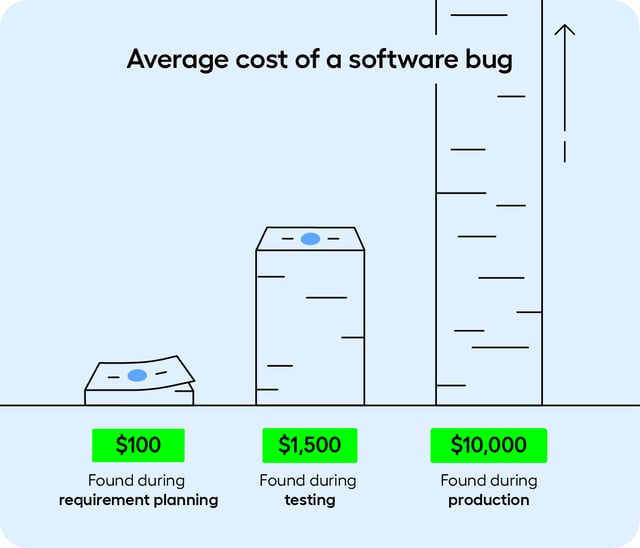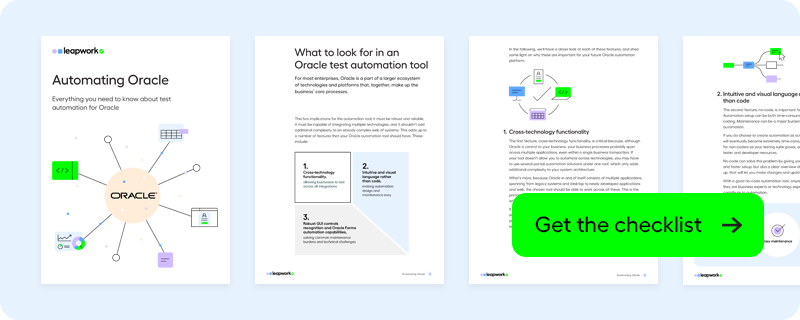Oracle Functional Testing with Automation: What’s the Best Approach?
Oracle is an Enterprise Resource Planning (ERP) tool used by enterprise businesses for a combination of business processes, from warehouse and supply chain management to insurance and customer relationship management.
While Oracle does have a standard offering, many organizations choose to build custom application components that can integrate with the Oracle E-Business Suite (EBS).
Businesses can modify the appearance, validation logic, and behavior of Oracle Forms. This can be done using Oracle’s Application Object Library along with other Oracle tools.
Testing oracle
To maintain the quality of the system, Oracle continuously goes through enhancements and improvements
- Enhancements to EBS to meet business needs. This includes when a new component is developed, and modifications are made to existing components.
- Improvements to EBS via upgrades. This includes preserving the customer components whenever there is an upgrade or simplifying the upgrade of custom components.
As with any software that can be customized or upgraded, it must be tested. Testing the customizations to software makes sure that, if something is broken, it is detected before anything is pushed to a live environment.
For example, if a bug went undetected during recent customization made to a component in the Financials module, and it meant that data on customer payments were not being received, it could lead to a massive financial loss.

To avoid this, it is normal for organizations to have a business manager, or Quality Assurance (QA) manager, overseeing the overall quality of the software through testing.
External factors can also play a part in the need to test your Oracle database. For example, many businesses have been faced with separating their European and British businesses in their database because of Brexit.
This could mean that custom regulations need to be added into the system for the divided groups, like additional paperwork for items being sent to the UK. In this case, you would have to test that the data has been accurately separated, and to do that efficiently, businesses often look to introduce automation.
The challenges of testing Oracle
As we have established, Oracle is no small system. It’s made up of many modules that work together to track anything from your company’s financial condition to the stock available in a warehouse.
Because of the size of the system, and the departments it spans across, testing the system can be quite complicated. Some of the most common challenges are:
- You have to deal with communication barriers from team to team.
- If you are manually testing, it takes a lot of time to get through the whole system, and it takes an additional effort to document the result of those tests in one central place.
- If you are automating testing with an automation framework, you may come across custom applications built on languages other than Java.
- You have to rely on expensive developer resources to build and maintain your Oracle Automation Framework whenever an update or change is made to your system. If that resource leaves, your entire testing system is left incredibly vulnerable since no one can really maintain it. Learn why automation frameworks in Oracle fail.
What’s the best approach to functional testing Oracle?
So what is the most efficient way to test Oracle, as a whole and in silos, when your team is being pushed to test the system faster so that updates or customizations can be released shortly after they have been made?
That answer relies on several factors:
What resources do you have available?
Oracle has been around for quite some time now. In some organizations, where Oracle has been a part of their processes for over 20 or 30 years, it can require old java versions or old browser versions of internet explorer.
This makes testing Oracle with modern solutions quite complicated. The natural solution is to build an Automation Framework, which requires expensive developer resources to build because of the age of the technology.
Once that person leaves, you are putting your Oracle system at huge risk, because your automation solution is no longer operational in the way it was before. If test cases break, no one has the suitable skills to fix them within the existing framework.
Changes are most likely being made every month, and that requires testing. This provides a short time frame for finding an alternative testing approach. Manual testing, in some cases, becomes a supplement.
Is your manual testing dragging your team down, both in terms of productivity and motivation?
Teams manually testing upgrades and enhancements in Oracle will be familiar with the tedious and time-consuming process of running through a regression suite.
It can make testing slower and burdensome, and it makes a system like Oracle more prone to bugs. This is because humans-error is at its peak when doing repetitive tasks, such as regression testing. For an enterprise with a complex digital ecosystem, this approach is not sustainable.
That is not to say that manual testing should be avoided, but it should be limited. A good rule of thumb is if the process is repeatable, it should be automated.
Have your automation efforts produced minimal returns in the past?
Conventional code-based automation solutions require expensive resources and a lot of time to implement. This often makes Automation Frameworks unreliable as they require a lot of maintenance and skilled resources.
It also makes it harder for an organization to adapt to changing market conditions, as an Automation Framework can slow down the testing process, and thus slow down the release of an upgrade or customization.
Related reading: Growing your automation suite with robotic process automation in Oracle
How quickly does your team need to get up and running?
If test automation is being considered, the skill sets required need to align with the tool you choose. There are two paradigms to take into consideration here when functional testing Oracle.
Programming-based automation requires testers to code. If testers are business users, this may prevent a valuable group of system experts from building automation and participating in testing Oracle.
Codeless automation, on the other hand, lets testers automate, whether they have a technical or business background. Rather than using code, you work with a visual designer. The learning curve becomes much shorter as it is not dependent on the tester learning how to code.
How can Leapwork help?
For businesses transiting from manual to automated testing, codeless automation allows for quick adoption of the tool. There is no need to learn how to program automation in Java, it’s all visual.
For a business transitioning from an Automation Framework to codeless automation, the maintenance workload becomes a fraction of what it once was. No need to continuously change strategies, or continuously fix broken code every time dynamic content changes.
- Easier automation in Oracle. Whatever the module you use in Oracle, whether on a legacy system, web, or desktop, Leapwork will automate it. It is possible to interact with dynamic content, forms, responsive layouts, and more.
- Automate across systems. Leapwork’s intuitive, visual approach to automation means your organization can run automation across all Oracle-based applications, and your entire digital landscape, without having to code.
- Rapid automation. Leapwork’s hyper-intuitive user interface hides all the complicated elements under the hood. This means Oracle automation can be built and maintained at speed.
- Short learning curve. As well as being easy to use, Leapwork comes with world-class support so your organization can experience the benefits of automation immediately.
If you're interested in Leapwork as an automation tool for Oracle, download this solution brief to learn how to ensure quality and speed up time-to-market with no-code automation.
However, if you still want to research more about the automation tools available on the market, then find the best tool for your automation needs in this comparison chart: Tools for Oracle Test Automation: Selenium, OATS, and Leapwork Comparison.

